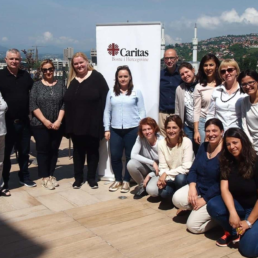Caritas Europa responded to the consultation organised by the European Commission on the implementation of the EU Anti-Trafficking Directive to assess the need for a possible revision of the EU Anti-trafficking Directive.
Caritas Europa’s contribution was informed thanks to the inputs of several of our member organisations, including Caritas Austria, France, Spain and Ukraine, as well as Renate Europe (Religious in Europe Networking against Trafficking and Exploitation). In addition, Caritas Germany and Caritas France also submitted their contribution to the consultation.
We also shared with the European Commission two complimentary briefing papers prepared by Caritas Spain and the Collective against the trafficking of human beings.
Our contribution highlights, among others, the need to:
- Adopt a victim-centred approach to the fight against human trafficking and better protect the victims.
- Provide an adequate mechanism of assistance, support and compensation to the victims of trafficking, including those returning to non-EU countries.
- Tackle the drivers that lead to people being trafficked, including poverty, lack of education and opportunities, sub-standard working conditions.
- Increase large scale and cross-border awareness campaign.
- Tackle new forms of trafficking, including those linked to the increased use of new technologies.
- Provide safe and regular pathways for migration to avoid people being forced to embark on dangerous journeys.
- Ensure coherence between interconnected EU legislations.
In addition, against the backdrop of the increased risk of trafficking of human beings and exploitation in the Ukrainian context, we stress the need to put awareness-raising campaigns and training, proper registration and identification mechanisms, and safeguarding policies. Caritas Europa and its member organisations developed a short document that targets staff and volunteers working with refugees to prevent the risk of trafficking and exploitation.
More information
Leïla Bodeux
Senior Policy and Advocacy Officer
Tel: +32 (0)2 235 26 55
Mob: +32 (0)478 585 409
lbodeux@caritas.eu




